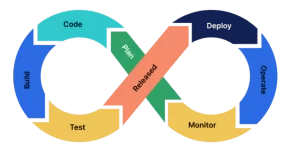AI, cloud and DevOps are revolutionizing the operations of modern businesses to innovate, operate and deliver value. The transformation has faster software release, predictive automation, and efficient-scale infrastructure. In the fields of finance, healthcare, retail, and entertainment, these technologies are now widely used to promote competitiveness and resilience. Skills that bridge these dimensions have, therefore, experienced an exploding demand.
Hence, DevOps Training engages the candidate in developing automation skills, cloud-native development, and AI-driven operations—all positions that are highly sought after in today’s tech world.

The Importance of these Technologies
Modern digital enterprises are under constant pressure to speed up their delivery cycle, operate faster and smarter, and scale with little to no friction. This is where cloud, DevOps, and AI come together:
- Cloud delivers on-demand infrastructure, scalable storage, and global access.
- DevOps shares a collaboration between Development and Operations teams to automate the delivery of software and infrastructure
- AI affords predictive insights, intelligent automation, and smarter user experiences.
Together, they promise to provide businesses with continuous delivery embedded with intelligence and resilience, all of which are critical to industries like finance, healthcare, e-commerce, and media.
DevOps Training as the Foundation for Transformation

DevOps acts like a modern enterprise workflow engine. It links code to deployment, testing to production, and even the teams with the outcomes. In the age of cloud-native technologies, DevOps is helping organizations roll out new features faster, thereby minimizing downtime and ensuring the best resource utilization.
Professionals who have been through proper DevOps training understand how to:
- Implement and maintain CI/CD pipelines
- Deploy and monitor applications in cloud environments
- Automate infrastructure with tools such as Terraform and Ansible
- Work with containers and orchestration platforms like Docker and Kubernetes
- Collaborate with version control and through agile methodologies
These are baseline requirements nowadays in tech roles.
Learn in depth about DevOps by exploring tools like Getting started with DevOps on AWS
The Cloud as the Foundation
Cloud providers such as AWS, Azure, and Google Cloud have changed the manner in which businesses host, scale, and secure their digital assets. Cloud computing caters to DevOps in providing:
- Elastic resources that respond to traffic needs
- DevOps-ready toolsets that integrate with the CI/CD pipeline with ease
- Backups are automated, audit security, and control mechanisms
- Deployable in the world for low-latency anytime access
Cloud is also the environment where experiments and quick rollouts take place so that the teams can safely innovate in a cost-effective manner. Expand your knowledge for Cloud platforms and services.
The Rise of AI-Driven DevOps (AIOps)
Artificial Intelligence enhances DevOps by applying automation that exceeds scripts and scheduled tasks. AI looks for patterns in deployment logs, predicts failures, and even suggests rollback strategies.
Some of the real-world uses could be:
- Analyze logs with AI to discover abnormality before disaster
- Test case generation and bug prediction from Machine Learning
- Incident response systems that intelligently route alerts and suggest remediation
- Capacity planning that is predictive based on past user behavior
AI makes DevOps not only an active but an intelligent process. Explore more about AIOPS
What This Means to You
Whether you’re a student aspiring for a career in technical fields, or a developer wishing to specialize in one domain, or being an IT professional shifting from one traditional role to a modern role, DevOps training truly is that portal to understanding and contributing to the power ecosystem.
Learn DevOps for AI and Cloud:
- Stay relevant in an ever-evolving market.
- Gain hands-on experience with tools used by the best companies.
- Become part of dynamic teams that create synergy to innovate across industries.
You may also like: Top 7 Cloud Computing Online Courses for 2025-2026 (Free & Paid)
Career Outlook and Opportunities
As businesses turned digital-first model, series then skyrocketed in demand for AI-cloud-DevOps professionals, with:
1. DevOps Engineer: Works on automating and streamlining software development and IT operations through CI/CD, infrastructure as code, and monitoring so that codes get deployed fast and reliably.
2. Cloud Architect: Designs and manages scalable, secure, and efficient cloud infrastructure and services according to business needs, mostly spanning through various cloud providers.
3. MLOps Engineer: An MLOps engineer is a bridge between data science and operations. They build and maintain automated and scalable pipelines for training, deployment, monitoring, and governance of machine learning models.
4. Site Reliability Engineer: Combines software engineering and IT operations to enhance system reliability, performance, and scalability, often reaching into infrastructure as code to manage incident response.
5. AI/DevOps Platform Specialist: Works on the design and maintenance of the platform supporting frameworks that integrate AI workloads and DevOps activities, facilitating the development, deployment, and scaling of AI solutions within a robust infrastructure ecosystem.
Looking Ahead: What’s Next?
AI, cloud, and DevOps are no longer isolated domains. They create a connected ecosystem in a modern business environment for fast, smart, and scalable software delivery. With businesses going ahead implementing the trio, DevOps Training now becomes not only a skill set but a mindset for the days ahead.
Advance Your Skills in AI, Cloud & DevOps Today
Take the leap into one of today’s most dynamic and rapidly evolving fields. Unlock Our Microsoft Certified Devops Engineer Expert.
Join the DevOps Training Bootcamp at Big Data Trunk. Learn from industry-proven experts, work on real projects, and get certified to create a resume that stands out.
FAQ
Q1. How long will one take to be job-ready with DevOps training?
One will be job-ready in 3-6 months if one is disciplined enough with the learning process, can do hands-on work, and has at least 3 completed projects in his/her portfolio.
Q2. Can I learn DevOps even if I don’t have a technical background?
Yeah! DevOps is not just for coders. Many tools are low-code or configuration-based. The positions are available to some people in operations, QA, or cloud backgrounds as well.
